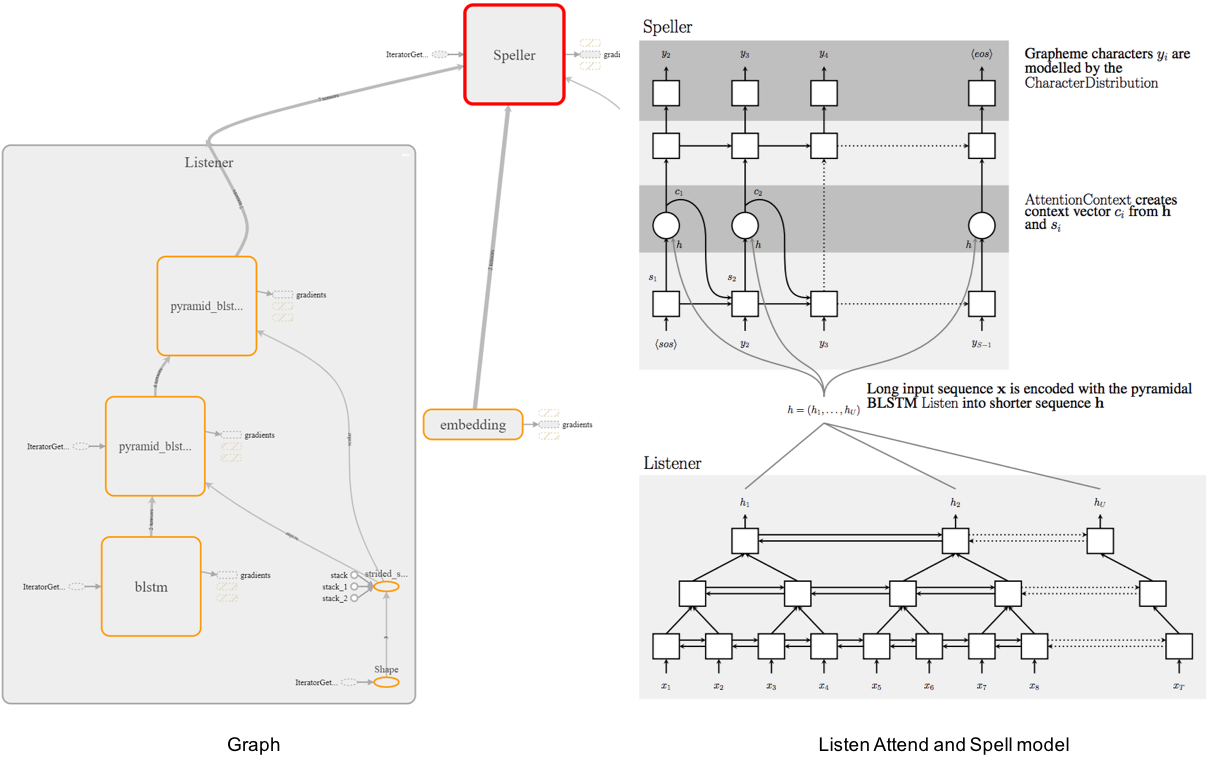A TensorFlow Implementation of Listen Attention and Spell
This is a tensorflow implementation of end-to-end ASR. Though there are several fantastic github repos in tensorflow, I tried to implement it without using tf.contrib.seq2seq API in this repo. In addition, the performance on LibriSpeech dev/test sets is evaluated and the evaluation results are reasonable.
- Components:
- Char/Subword text encoding.
- MFCC/fbank acoustic features with per utterance CMVN.
- LAS training (visualized with tensorboard: loss, sample text outputs, features, alignments).
- TFrecord dataset pipline.
- Batch testing using greedy decoder.
- Beam search decoder.
- RNNLM.
Note that this project is still in progress.
-
Notes
- Currently, I only test this model on MFCC 39 (13+delta+accelerate) features.
- CTC related parts are not yet fully tested.
- Volume augmentation is currently commented out because it shows little improvements.
-
Improvements
- CNN-based Listener.
- Location-aware attention.
- Augmentation include speed perturbation.
- Label smoothing. (IMPORANT)
- Scheduled learning rate.
- Scheduled sampling.
- Bucketing.
-
Some advice
- Generally, LibriSpeech-100 is not large enough to train a well-perform LAS.
- In my experience, adding more data is the best policy.
- A better way to check if your model is learning in a right way is to monitor the speech-text aligments in tensorboard or set verbosity=1.
pip3 install virtualenv
virtualenv --python=python3 venv
source venv/bin/activate
pip3 install -r requirements.txtThe definitions of the args are described in las/arguments.py. You can modify all args there before preprocessing, training, testing and decoding.
- Libirspeech train/dev/test data
bash prepare_libri_data.sh I include dataset pipeline and training pipeline in run.sh.
bash run.shTrain RNNLM: (NOT READY)
Testing with gready decoder.
python3 test.py --split SPLIT \ # test or dev
--unit UNIT \
--feat_dim FEAT_DIM \
--feat_dir FEAT_DIR \
--save_dir SAVE_DIR Beam search decoder.
python3 decode.py --split SPLIT \ # test or dev
--unit UNIT \
--beam_size BEAM_SIZE \
--convert_rate 0.24 \ # 0.24 is large enough.
--apply_lm APPLY_LM \
--lm_weight LM_WEIGHT \
--feat_dim FEAT_DIM \
--feat_dir FEAT_DIR \
--save_dir SAVE_DIR tensorboard --logdir ./summary
Results trained on LibriSpeech-360 (WER)
| Model | dev-clean | test-clean |
|---|---|---|
| Char LAS | 0.249 | 0.262 |
- Listen, Attend and Spell
- Attention-Based Models for Speech Recognition
- On the Choice of Modeling Unit for Sequence-to-Sequence Speech Recognition
- Char RNNLM: TensorFlow-Char-RNN
- A nice Pytorch version: End-to-end-ASR-Pytorch.
- Add scheduled sampling.
- Add location-aware attention.
- Evaluate the performance with subword unit: Subword las training.
- Decoding with subword-based RNNLM.
- Evaluate the performance on joint CTC training, decoding.

